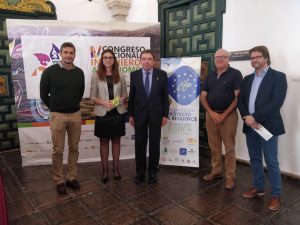The innovation fair «Smart Rural Fimart», showcase of innovation and technology for the rural world has served as the setting for the presentation of the European project Life Resilience.
The event took place in the Expofimart space located in the Palacio de la Merced in Córdoba where Teresa Carrillo, project director, was in charge of explaining the objectives and planned actions of Life Resilience for the next three years.
This project, co-financed by the Life program of the European Union, aims to find new sustainable and productive practices for the prevention of Xylella fastidiosa in the olive and almond tree plantations in intensive, as well as the obtaining of varieties tolerant to this disease that allow facing the future of these productions with optimism.
The consortium that makes up this project brings together companies and institutions from Spain, Italy and Portugal being its partners: Galpagro, the University of Córdoba, Agrifood Comunicación, Agrodrone and ASAJA Nacional. In addition, Life Resilience has the participation of Nutriprado and SAHC-Agricultural Society of Herdade do Charqueirao, S.A. in Portugal; and the Italian entities Gruppo Salov and the Istituto per la Valorizzazione del Legno e delle Specie Arboree (IVALSA), belonging to the Consiglio Nazionale Delle Ricerche of Italy.
Teresa Carrillo, director of the project, highlighted in its presentation the importance of developing new varieties that allow the creation of more tolerant olive trees and almonds to the Xylella fastidiosa and, in this way, avoid the spread of the bacteria and its consequences.
Likewise, Life Resilience has been present with a stand during the whole fair explaining the project to the visitors and inviting them to participate in the dissemination of all the activities that are developed in the future.
The project aims to demonstrate that with better sustainable practices and technologies can reduce water consumption and carbon footprint, increase biodiversity and resistance to pathogens without compromising performance; starting from a biological control of the vectors in the environment of the plantations. All the processes that will be carried out during the project are aimed at increasing the system’s resilience, quality and environmental sustainability.
In this way we will look for a replicable model of best practices for olive and almond trees, as well as other woody, citrus and vine crops in Europe, increasing their capacity to adapt to climate change and future epidemics
